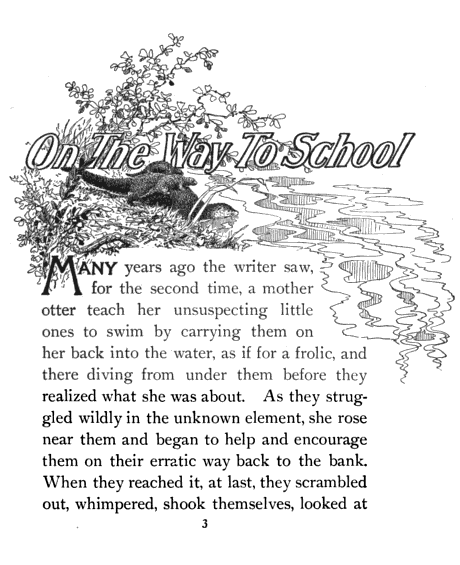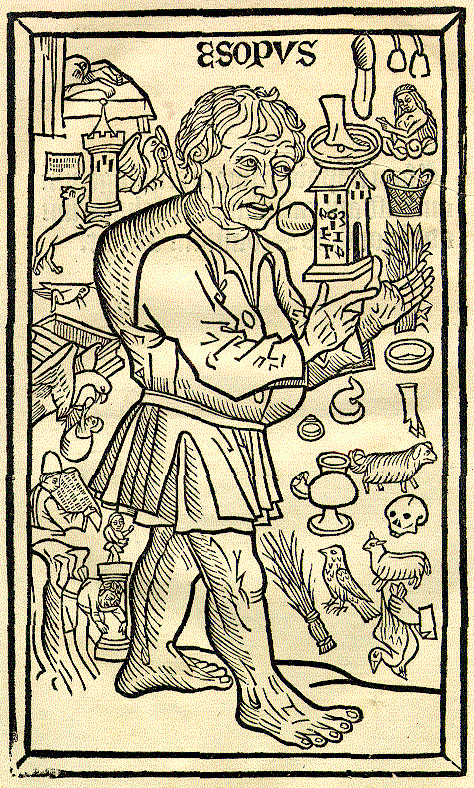|
Nature Fakers Controversy
The nature fakers controversy was an early 20th-century American literary debate highlighting the conflict between science and sentiment in popular nature writing. The debate involved important American literary, environmental and political figures. Dubbed the "War of the Naturalists" by ''The New York Times'', it revealed seemingly irreconcilable contemporary views of the natural world: while some nature writers of the day argued as to the veracity of their examples of anthropomorphic wild animals, others questioned an animal's ability to adapt, learn, teach, and reason. The controversy arose from a new literary movement, which followed a growth of interest in the natural world beginning in the late 19th century, and in which the natural world was depicted in a compassionate rather than realistic light. Works such as Ernest Thompson Seton's '' Wild Animals I Have Known'' (1898) and William J. Long's ''School of the Woods'' (1902) popularized this new genre and emphasized sympat ... [...More Info...] [...Related Items...] OR: [Wikipedia] [Google] [Baidu] |
Central Park
Central Park is an urban park between the Upper West Side and Upper East Side neighborhoods of Manhattan in New York City, and the first landscaped park in the United States. It is the List of parks in New York City, sixth-largest park in the city, containing , and the most visited urban park in the United States, with an estimated 42 million visitors annually . It is also one of the most filmed locations in the world. The creation of a large park in Manhattan was first proposed in the 1840s, and a park approved in 1853. In 1858, landscape architects Frederick Law Olmsted and Calvert Vaux won a Architectural design competition, design competition for the park with their "Greensward Plan". Construction began in 1857; existing structures, including a majority-Black settlement named Seneca Village, were seized through eminent domain and razed. The park's first areas were opened to the public in late 1858. Additional land at the northern end of Central Park was purchased in ... [...More Info...] [...Related Items...] OR: [Wikipedia] [Google] [Baidu] |
Rudyard Kipling
Joseph Rudyard Kipling ( ; 30 December 1865 – 18 January 1936)''The Times'', (London) 18 January 1936, p. 12. was an English journalist, novelist, poet, and short-story writer. He was born in British Raj, British India, which inspired much of his work. Kipling's works of fiction include the ''Jungle Book'' -logy, duology (''The Jungle Book'', 1894; ''The Second Jungle Book'', 1895), ''Kim (novel), Kim'' (1901), the ''Just So Stories'' (1902) and many short stories, including "The Man Who Would Be King" (1888). His poems include "Mandalay (poem), Mandalay" (1890), "Gunga Din" (1890), "The Gods of the Copybook Headings" (1919), "The White Man's Burden" (1899), and "If—" (1910). He is seen as an innovator in the art of the short story.Rutherford, Andrew (1987). General Preface to the Editions of Rudyard Kipling, in "Puck of Pook's Hill and Rewards and Fairies", by Rudyard Kipling. Oxford University Press. His children's books are classics; one critic noted "a versatile and l ... [...More Info...] [...Related Items...] OR: [Wikipedia] [Google] [Baidu] |
Aesop
Aesop ( ; , ; c. 620–564 BCE; formerly rendered as Æsop) was a Greeks, Greek wikt:fabulist, fabulist and Oral storytelling, storyteller credited with a number of fables now collectively known as ''Aesop's Fables''. Although his existence remains unclear and no writings by him survive, numerous tales credited to him were gathered across the centuries and in many languages in a storytelling tradition that continues to this day. Many of the tales associated with him are characterized by anthropomorphic animal characters. Scattered details of Aesop's life can be found in ancient sources, including Aristotle, Herodotus, and Plutarch. An ancient literary work called ''The Aesop Romance'' tells an episodic, probably highly fictional version of his life, including the traditional description of him as a strikingly ugly Slavery in Ancient Greece, slave () who by his cleverness acquires freedom and becomes an adviser to kings and city-states. Older spellings of his name have included ... [...More Info...] [...Related Items...] OR: [Wikipedia] [Google] [Baidu] |
Lobo (The King Of Currumpaw)
"Lobo, the King of Currumpaw" is the first story of author Ernest Thompson Seton's 1898 book '' Wild Animals I Have Known''. Seton based the book on his experience hunting wolves in the Southwestern United States. Summary Lobo was a North American Mexican gray wolf who lived in the Currumpaw Valley ( Corrumpa Creek) in New Mexico. During the 1890s, Lobo and his pack, having been deprived of their natural prey such as bison, elk, and pronghorn by settlers, became forced to prey on the settlers' livestock to survive. The ranchers (at Cross L Ranch) tried to kill Lobo and his pack by poisoning critter carcasses, but the wolves removed the poisoned pieces and threw them aside, eating the rest. They tried to kill the wolves with traps and by hunting parties, but these efforts also failed. Ernest Thompson Seton was tempted by the challenge and the $1,000 bounty for the head of Lobo, the leader of the pack. Seton tried poisoning four baits, carefully covering traces of human scent, an ... [...More Info...] [...Related Items...] OR: [Wikipedia] [Google] [Baidu] |
Literature
Literature is any collection of Writing, written work, but it is also used more narrowly for writings specifically considered to be an art form, especially novels, Play (theatre), plays, and poetry, poems. It includes both print and Electronic literature, digital writing. In recent centuries, the definition has expanded to include oral literature, much of which has been transcribed.; see also Homer. Literature is a method of recording, preserving, and transmitting knowledge and entertainment. It can also have a social, psychological, spiritual, or political role. Literary criticism is one of the oldest academic disciplines, and is concerned with the literary merit or intellectual significance of specific texts. The study of books and other texts as artifacts or traditions is instead encompassed by textual criticism or the history of the book. "Literature", as an art form, is sometimes used synonymously with literary fiction, fiction written with the goal of artistic merit, but ... [...More Info...] [...Related Items...] OR: [Wikipedia] [Google] [Baidu] |
Nature Study
The nature study movement (alternatively, Nature Study or nature-study) was a popular education movement that originated in the United States and spread throughout the English-speaking world in the late 19th and early 20th centuries. Nature study attempted to reconcile scientific investigation with spiritual, personal experiences gained from interaction with the natural world. Led by progressive educators and naturalists such as Anna Botsford Comstock, Liberty Hyde Bailey, Louis Agassiz, William Gould Vinal, and Wilbur S. Jackman, nature study changed the way science was taught in schools by emphasizing learning from tangible objects, something that was embodied by the movement's mantra: "study nature, not books." The movement popularized scientific study outside of the classroom as well, and has proven highly influential for figures involved in the modern environmental movement, such as Aldo Leopold and Rachel Carson. Background By the mid-19th century, a growing concern f ... [...More Info...] [...Related Items...] OR: [Wikipedia] [Google] [Baidu] |
Charles Darwin
Charles Robert Darwin ( ; 12 February 1809 – 19 April 1882) was an English Natural history#Before 1900, naturalist, geologist, and biologist, widely known for his contributions to evolutionary biology. His proposition that all species of life have descended from a Common descent, common ancestor is now generally accepted and considered a fundamental scientific concept. In a joint presentation with Alfred Russel Wallace, he introduced his scientific theory that this Phylogenetics, branching pattern of evolution resulted from a process he called natural selection, in which the struggle for existence has a similar effect to the artificial selection involved in selective breeding.. Darwin has been described as one of the most influential figures in human history and was honoured by Burials and memorials in Westminster Abbey, burial in Westminster Abbey. Darwin's early interest in nature led him to neglect his medical education at the University of Edinburgh Medical Schoo ... [...More Info...] [...Related Items...] OR: [Wikipedia] [Google] [Baidu] |
Evolution
Evolution is the change in the heritable Phenotypic trait, characteristics of biological populations over successive generations. It occurs when evolutionary processes such as natural selection and genetic drift act on genetic variation, resulting in certain characteristics becoming more or less common within a population over successive generations. The process of evolution has given rise to biodiversity at every level of biological organisation. The scientific theory of evolution by natural selection was conceived independently by two British naturalists, Charles Darwin and Alfred Russel Wallace, in the mid-19th century as an explanation for why organisms are adapted to their physical and biological environments. The theory was first set out in detail in Darwin's book ''On the Origin of Species''. Evolution by natural selection is established by observable facts about living organisms: (1) more offspring are often produced than can possibly survive; (2) phenotypic variatio ... [...More Info...] [...Related Items...] OR: [Wikipedia] [Google] [Baidu] |
Cult
Cults are social groups which have unusual, and often extreme, religious, spiritual, or philosophical beliefs and rituals. Extreme devotion to a particular person, object, or goal is another characteristic often ascribed to cults. The term has different, and sometimes divergent or pejorative, definitions both in popular culture and academia and has been an ongoing source of contention among scholars across several fields of study. Beginning in the 1930s, new religious movements became an object of sociological study within the context of the study of religious behavior. Since the 1940s, the Christian countercult movement has opposed some sects and new religious movements, labeling them cults because of their unorthodox beliefs. Since the 1970s, the secular anti-cult movement has opposed certain groups, which they call cults, accusing them of practicing brainwashing. Groups labelled cults are found around the world and range in size from small localized groups to some in ... [...More Info...] [...Related Items...] OR: [Wikipedia] [Google] [Baidu] |
Sierra Club
The Sierra Club is an American environmental organization with chapters in all 50 U.S. states, Washington, D.C., Washington D.C., and Puerto Rico. The club was founded in 1892, in San Francisco, by preservationist John Muir. A product of the Progressivism in the United States, progressive movement, it was one of the first large-scale environmental preservation organizations in the world. It has lobbied for policies to promote sustainable energy and mitigating global warming, as well as Beyond Coal, opposing the use of coal, hydropower, and nuclear power. Its political endorsements generally favor Modern liberalism in the United States, liberal and progressive candidates in elections. In addition to political advocacy, the Sierra Club organizes outdoor recreation activities, and has historically been a notable organization for mountaineering and rock climbing in the United States. Members of the Sierra Club pioneered the Yosemite Decimal System of climbing, and were responsible fo ... [...More Info...] [...Related Items...] OR: [Wikipedia] [Google] [Baidu] |
John Muir
John Muir ( ; April 21, 1838December 24, 1914), also known as "John of the Mountains" and "Father of the national park, National Parks", was a Scottish-born American naturalist, author, environmental philosopher, botanist, zoologist, glaciologist, and early advocate for the preservation of wilderness in the United States. His books, letters and essays describing his adventures in nature, especially in the Sierra Nevada, have been read by millions. His activism helped to preserve the Yosemite Valley and Sequoia National Park, and his example has served as an inspiration for the preservation of many other wilderness areas. The Sierra Club, which he co-founded, is a prominent American conservation organization. In his later life, Muir devoted most of his time to his wife and the preservation of the Western forests. As part of the campaign to make Yosemite a national park, Muir published two landmark articles on wilderness preservation in ''The Century Magazine'', "The Treasures of ... [...More Info...] [...Related Items...] OR: [Wikipedia] [Google] [Baidu] |







